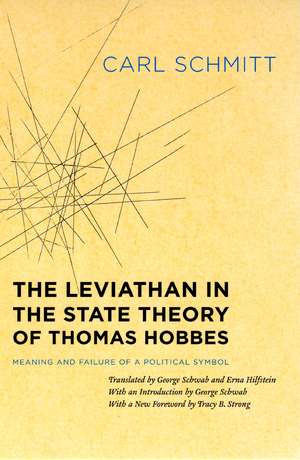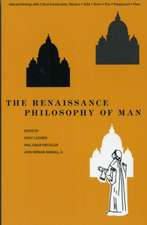The Leviathan in the State Theory of Thomas Hobbes: Meaning and Failure of a Political Symbol
Autor Carl Schmitt Cuvânt înainte de Tracy B. Strong Traducere de George Schwab, Erna Hilfsteinen Limba Engleză Paperback – 6 noi 2008
One of the most significant political philosophers of the twentieth century, Carl Schmitt is a deeply controversial figure who has been labeled both Nazi sympathizer and modern-day Thomas Hobbes. First published in 1938, The Leviathan in the State Theory of Thomas Hobbes used the Enlightenment philosopher’s enduring symbol of the protective Leviathan to address the nature of modern statehood. A work that predicted the demise of the Third Reich and that still holds relevance in today’s security-obsessed society, this volume will be essential reading for students and scholars of political science.
“Carl Schmitt is surely the most controversial German political and legal philosopher of this century. . . . We deal with Schmitt, against all odds, because history stubbornly persists in proving many of his tenets right.”—Perspectives on Political Science
“[A] significant contribution. . . . The relation between Hobbes and Schmitt is one of the most important questions surrounding Schmitt: it includes a distinct, though occasionally vacillating, personal identification as well as an association of ideas.”—Telos
“Carl Schmitt is surely the most controversial German political and legal philosopher of this century. . . . We deal with Schmitt, against all odds, because history stubbornly persists in proving many of his tenets right.”—Perspectives on Political Science
“[A] significant contribution. . . . The relation between Hobbes and Schmitt is one of the most important questions surrounding Schmitt: it includes a distinct, though occasionally vacillating, personal identification as well as an association of ideas.”—Telos
Preț: 175.48 lei
Nou
Puncte Express: 263
Preț estimativ în valută:
33.58€ • 35.06$ • 27.79£
33.58€ • 35.06$ • 27.79£
Carte disponibilă
Livrare economică 14-28 martie
Livrare express 28 februarie-06 martie pentru 17.84 lei
Preluare comenzi: 021 569.72.76
Specificații
ISBN-13: 9780226738949
ISBN-10: 0226738949
Pagini: 184
Dimensiuni: 140 x 216 x 3 mm
Greutate: 0.2 kg
Editura: University of Chicago Press
Colecția University of Chicago Press
ISBN-10: 0226738949
Pagini: 184
Dimensiuni: 140 x 216 x 3 mm
Greutate: 0.2 kg
Editura: University of Chicago Press
Colecția University of Chicago Press
Notă biografică
Carl Schmitt (1888–1985) was a legal and political theorist and constitutional lawyer. He is the author of several books published by the University of Chicago Press, including The Concept of the Political and Political Theology.
George D. Schwab is the president of the National Committee on American Foreign Policy, which he cofounded in 1974, and professor emeritus of history at the City University of New York (Graduate Center and City College).
George D. Schwab is the president of the National Committee on American Foreign Policy, which he cofounded in 1974, and professor emeritus of history at the City University of New York (Graduate Center and City College).
Erna Hilfstein (1925–2003) was a science historian and the author of Sarowolski's Biographies of Copernicus.
Cuprins
Foreword, 2008
Carl Schmitt and Thomas Hobbes: Myth and Politics
Tracy B. Strong
Foreword, 1996
George Schwab
Introduction
George Schwab
Translator’s Note
George Schwab and Erna Hilfstein
Introduction
Carl Schmitt
Overview of Chapters I through VII
Chapter ICarl Schmitt and Thomas Hobbes: Myth and Politics
Tracy B. Strong
Foreword, 1996
George Schwab
Introduction
George Schwab
Translator’s Note
George Schwab and Erna Hilfstein
Introduction
Carl Schmitt
Overview of Chapters I through VII
Chapter II
Chapter III
Chapter IV
Chapter V
Chapter VI
Chapter VII
Appendix: The State as a Mechanism in Hobbes and Descartes
Index
Recenzii
“The English translation of this work is truthful to the German original and permits the critical reader to understand Schmitt . . . the way he understood himself.”
“Carl Schmitt is surely the most controversial German political and legal philosopher of this century. . . . We deal with Schmitt, against all odds, because history stubbornly persists in proving many of his tenets right.”
“[A] significant contribution. . . . The relation between Hobbes and Schmitt is one of the most important questions surrounding Schmitt: it includes a distinct, though occasionally vacillating, personal identification as well as an association of ideas.”










